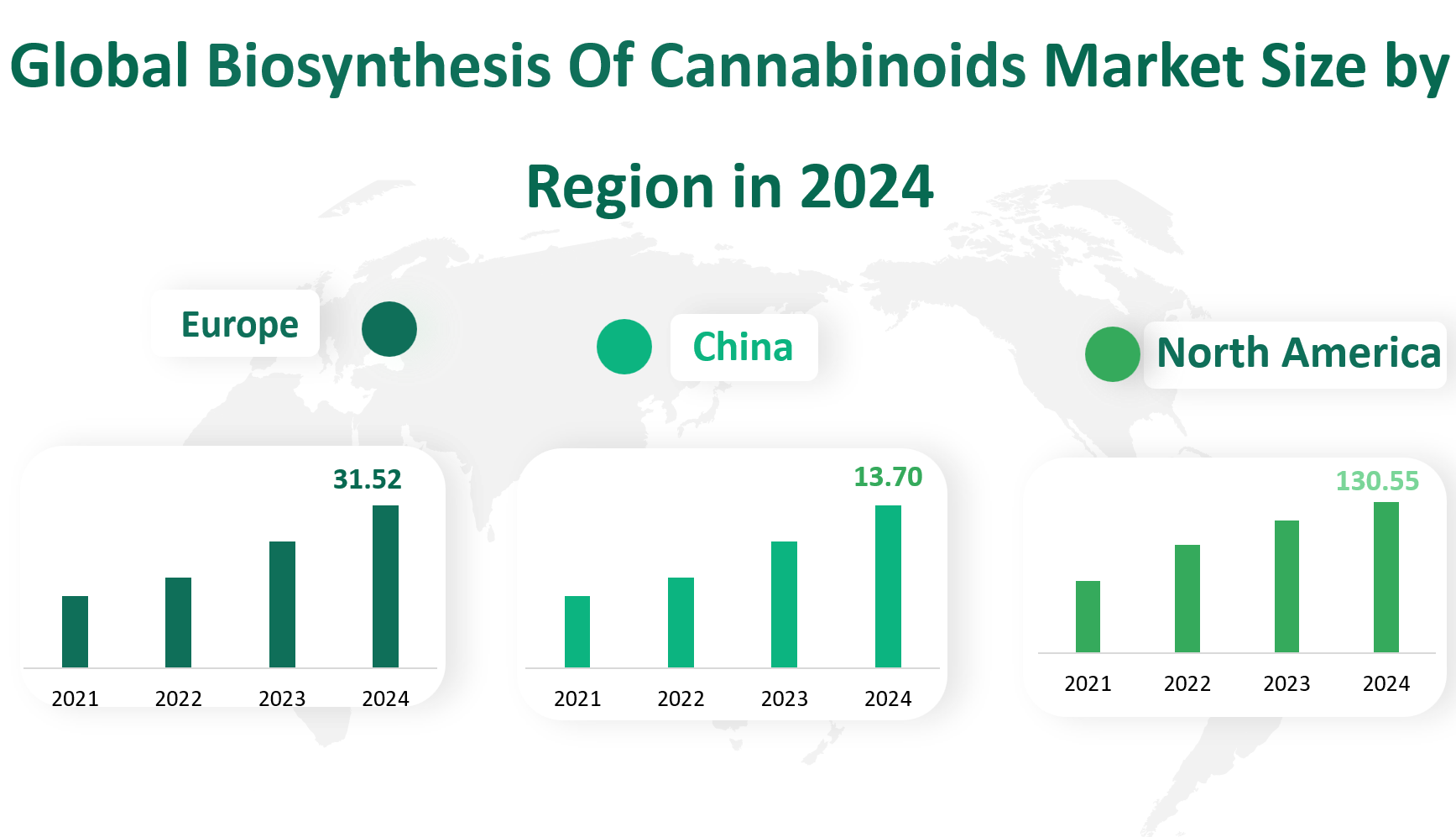1. Global Biosynthesis Of Cannabinoids Market Insight Analysis
The global Biosynthesis of Cannabinoids market is projected to reach 186.59 million USD in 2024, with a Compound Annual Growth Rate (CAGR) of 14.00% from 2024 to 2033.
Biosynthesis of cannabinoids refers to the process of producing cannabinoids, the active compounds found in cannabis plants, through biological methods rather than traditional extraction. This innovative approach leverages the power of biology to create these compounds in a more sustainable, scalable, and cost-effective manner. Unlike traditional extraction methods, which can be time-consuming and yield inconsistent results, biosynthesis allows for the production of high-purity cannabinoids in a controlled environment. This method not only reduces the environmental impact but also ensures a consistent supply of these valuable compounds, making them more accessible for research and commercial applications.
Figure Global Biosynthesis Of Cannabinoids Market Size (M USD) and CAGR (2024-2033)

2. Driving and Limiting Factors of Biosynthesis Of Cannabinoids Market Growth
The growth of the Biosynthesis of Cannabinoids market is influenced by several key factors. One of the primary drivers is the reduction in manufacturing costs. Traditional methods of extracting cannabinoids from cannabis plants are not only expensive but also yield low quantities, especially for rare cannabinoids. Biosynthesis, on the other hand, offers a more efficient and cost-effective alternative. By using genetically modified yeast or other microorganisms, companies can produce cannabinoids at a fraction of the cost and in a shorter timeframe. This technology also allows for the production of a wider range of cannabinoids, including those that are difficult to obtain from plants.
Another significant driver is the gradual legalization of cannabis in various regions. Countries like Canada, the UK, and several US states have legalized medical and recreational cannabis, leading to increased demand for cannabinoids. This trend is expected to continue as more regions reconsider their stance on cannabis, potentially opening up new markets for biosynthetic cannabinoids.
However, the market also faces several challenges. One of the primary concerns is the use of genetically modified (GM) technology in the biosynthesis process. While GM technology has been widely used in other industries, it still raises safety concerns among some consumers and regulatory bodies. Companies in this space need to address these concerns through rigorous testing and transparent communication.
Additionally, legal restrictions remain a significant barrier. Despite the progress in legalization, cannabis and its derivatives are still illegal in many parts of the world. This limits the market’s potential and creates uncertainty for companies operating in this space. Changes in local laws can also be unpredictable, adding another layer of risk.
3. Technology Innovation and Corporate Mergers and Acquisitions in Biosynthesis Of Cannabinoids Market
The Biosynthesis of Cannabinoids market is characterized by rapid technological innovation. Companies are constantly exploring new ways to improve the efficiency and scalability of their biosynthesis processes. For example, Ginkgo Bioworks has developed advanced fermentation techniques that allow for the production of high-purity cannabinoids. Similarly, Teewinot Life Sciences has patented a biocatalytic process that enables the production of rare cannabinoids at a commercial scale.
Corporate mergers and acquisitions are also playing a crucial role in shaping the market. Companies are looking to expand their capabilities and market share through strategic partnerships and acquisitions. For instance, Demetrix secured $50 million in Series A funding to further develop its biosynthesis technology. These financial injections not only provide companies with the resources to innovate but also signal investor confidence in the market’s potential.
In addition to technological advancements and strategic partnerships, companies are also focusing on expanding their product portfolios. Hyasynth Bio, for example, is working on developing a wide range of cannabinoids, including those with potential therapeutic applications. This diversification strategy allows companies to tap into different market segments and reduce their reliance on a single product.
4. Global Biosynthesis Of Cannabinoids Market Size by Type
The biosynthesis of cannabinoids market is primarily segmented into three major product types: THC (Tetrahydrocannabinol), CBD (Cannabidiol), and Others.
THC is the principal psychoactive constituent of cannabis. It is known for its euphoric and intoxicating effects. In the context of biosynthesis, THC is produced through microbial fermentation processes, which allow for the creation of high-purity THC without the need for traditional plant cultivation. This method not only reduces the environmental impact but also ensures a consistent and scalable supply of THC for various applications, including pharmaceuticals and recreational products.
In 2024, the market size for biosynthetic THC is forecasted to be approximately $88.22 million. This represents a significant portion of the overall biosynthesis of cannabinoids market. The growth in demand for THC is driven by its increasing acceptance in medical treatments for conditions such as chronic pain, muscle spasms, and nausea. Additionally, the recreational market continues to expand as more regions legalize cannabis use, further fueling the demand for biosynthetic THC.
CBD is a non-psychoactive cannabinoid known for its therapeutic properties. It is widely used in the medical and wellness sectors for its potential benefits in treating epilepsy, anxiety, and inflammation. Biosynthetic CBD is produced through similar fermentation processes as THC, ensuring high purity and consistency. The market size for biosynthetic CBD in 2024 is projected to be around $81.55 million.
Table Global Biosynthesis Of Cannabinoids Market Size by Type in 2024
5. Global Biosynthesis Of Cannabinoids Market Size by Application
The biosynthesis of cannabinoids market serves a variety of applications across different industries. The primary applications include the Food Industry, Medical Industry, and Other sectors.
The food industry is a significant consumer of biosynthetic cannabinoids, particularly CBD. Cannabinoids are increasingly being incorporated into food products, such as edibles, beverages, and supplements, due to their potential health benefits. These products are marketed for their wellness properties, including stress relief, improved sleep, and enhanced cognitive function.
In 2024, the market size for the application of biosynthetic cannabinoids in the food industry is forecasted to be approximately $88.40 million. This represents a substantial portion of the overall market, driven by the growing consumer interest in functional foods and the increasing availability of cannabinoid-infused products. The food industry’s adoption of biosynthetic cannabinoids is expected to continue growing as more research supports their health benefits and regulatory frameworks become more accommodating.
The medical industry is another major application area for biosynthetic cannabinoids. Both THC and CBD are used in the development of pharmaceutical products for treating various medical conditions. THC is commonly used for pain management, muscle spasms, and nausea, while CBD is being explored for its potential in treating epilepsy, anxiety, and inflammation. Biosynthetic cannabinoids offer a reliable and scalable source for these medical applications, ensuring consistent quality and supply.
In 2024, the market size for the application of biosynthetic cannabinoids in the medical industry is projected to be around $103.75 million. This segment is driven by the increasing recognition of cannabinoids’ therapeutic potential and the growing number of clinical trials and research studies exploring their medical applications. The medical industry’s demand for biosynthetic cannabinoids is expected to remain strong as more countries and regions legalize their use in medical treatments.
Table Global Biosynthesis Of Cannabinoids Market Size by Application in 2024
Application | Market Size (M USD) 2024 |
Food Industry | 88.40 |
Medical Industry | 103.75 |
Others | 16.81 |
6. Global Biosynthesis Of Cannabinoids Market by Top Regions
North America is the largest regional market for the biosynthesis of cannabinoids. In 2024, the market size in North America is forecasted to be around $130.55 million. This region has been at the forefront of cannabis legalization and has a well-established infrastructure for both medical and recreational cannabis use. The market share of North America in 2024 is projected to be approximately 69.95%, making it the dominant region in terms of revenue.
Europe is the second-largest regional market for the biosynthesis of cannabinoids. In 2024, the market size in Europe is forecasted to be around $31.52 million. European countries such as the United Kingdom, Germany, and the Netherlands have been progressive in their approach to medical cannabis, leading to a growing demand for biosynthetic cannabinoids. The market share of Europe in 2024 is projected to be approximately 16.89%.
China is the fastest-growing market for the biosynthesis of cannabinoids. In 2024, the market size in the China is forecasted to be around $13.70 million.
Figure Global Biosynthesis Of Cannabinoids Market Size by Region in 2024

7. Global Biosynthesis Of Cannabinoids Market Analysis by Major Players
7.1 Gingko Bioworks
Company Introduction and Business Overview
Gingko Bioworks, headquartered in the United States, is a leading biotechnology company specializing in the biosynthesis of cannabinoids. Founded in 2009, Gingko Bioworks uses advanced biological engineering to produce high-purity cannabinoids through microbial fermentation. The company’s mission is to harness the power of biology to create sustainable and scalable solutions for the production of cannabinoids.
Products Offered
Gingko Bioworks offers a range of biosynthetic cannabinoids, including THC and CBD. The company’s products are used in various applications, from pharmaceuticals to consumer goods. Gingko Bioworks is particularly known for its ability to produce rare cannabinoids that are difficult to obtain through traditional extraction methods.
7.2 Teewinot Life Sciences
Company Introduction and Business Overview
Teewinot Life Sciences, based in the United States, is a global leader in the biosynthetic development and production of cannabinoids. Founded in 2009, the company leverages a unique integrated biocatalytic and chemical synthesis platform to produce a wide range of cannabinoids and cannabinoid derivatives. Teewinot Life Sciences is committed to revolutionizing the synthetic cannabinoid space with its cost-effective, commercial-scale approach.
Products Offered
Teewinot Life Sciences offers a comprehensive range of biosynthetic cannabinoids, including THC and CBD. The company’s products are used in both pharmaceutical and consumer applications, with a focus on meeting the growing demand for high-purity cannabinoids.
7.3 Hyasynth Bio
Company Introduction and Business Overview
Hyasynth Bio, headquartered in Canada, is a leading biotechnology company specializing in the biosynthesis of cannabinoids. Founded in 2014, Hyasynth Bio uses advanced biological engineering to produce high-purity cannabinoids through microbial fermentation. The company’s platform is designed to be faster and cheaper than traditional chemical synthesis or extraction methods.
Products Offered
Hyasynth Bio offers a range of biosynthetic cannabinoids, including THC and CBD. The company’s products are used in various applications, from pharmaceuticals to consumer goods. Hyasynth Bio is particularly known for its ability to produce high-purity cannabinoids with minimal environmental impact.

